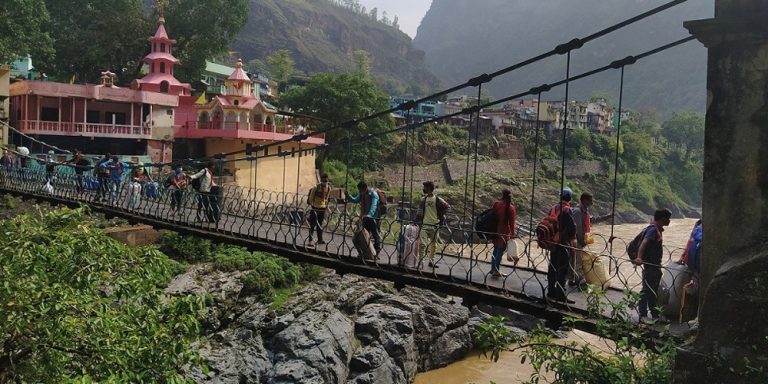
Inhabitants of both Nepal and India have been struggling to cross the border point at Jhulalghat, in Baitadi district, for a lack of a proper bridge. The 150-year-old suspension bridge has worn out several times but has been brought into use each time after renovations.
Around two months ago, commuting along the bridge was halted for four days to renovate it. But locals now fear that it would now collapse beyond repair. “The bridge was constructed by the East India Company more than a century ago. When we walk over it, as we have no other choice, we are in constant fear,” said Jay Singh Bhat, a local of Jhulalghat.
Jhulalghat has been connected with the road network for more than four decades now, but the dearth of a motorable bridge has been affecting the effort to cross the border. It is an 18-kilometer distance from Baitadi’s headquarters to Jhulalghat.
Many Nepali students from Ward No. 10 of Dasharathchand Municipality use the bridge to cross Jhulalghat and attend school across the border.
“Due to the lack of a motorable bridge, porters have been bringing the goods into the village from the Indian market. It costs Rs. 7 extra per kilogram on very good,” said Raghubir Thapa, a local businessman.
Many Indian nationals also cross the bridge to reach Baitadi’s Tripura Sundari Temple regularly. The lack of a proper bridge has also caused disturbances during rituals and marriages of people from both countries. A great many Nepalis from different parts of the Sudurpashchim and Karnali Provinces also use the Jhulalghat Bridge to enter India as migrant workers.
Sick individuals from Baitadi, Darchula, Dadeldhura, and Bajhang districts among others also use it to reach India for treatment. While patients are taken up to the bridge on a vehicle, they are taken across the bridge on a stretcher.
Concerned stakeholders informed that no process has been initiated by authorities to construct a motorable bridge in the area despite several struggles.
“On September 9, 2019, locals and businesses of Jhulalghat had staged a relay hunger strike for a month demanding construction of a bridge, but to no avail,” said Nar Bahadur Chand, chairman at Baitadi’s Federation of Nepalese Chambers of Commerce and Industry.
Chand added, “We staged a strike for a month demanding a bridge in Baitadi. Now, we are hearing that a bridge is instead being constructed in Darchula district, which already has seven suspension bridges.”
Two decades ago, Nepali and Indian businesses there had coordinated and collected 10,000 signatures demanding a proper bridge and submitted them to the Nepal government and Indian Embassy. That, too, fell on deaf ears.
Source : TRN,






